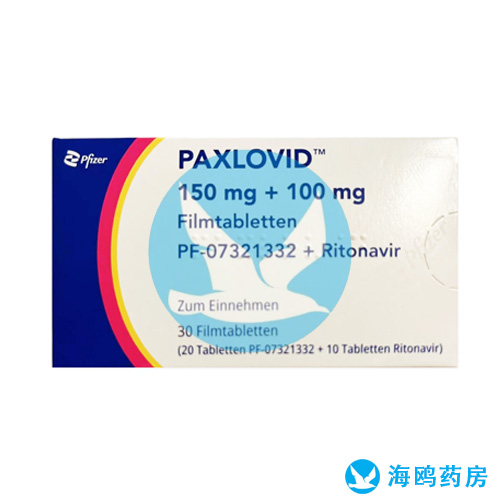
Paxlovid
Pfizer Inc
$196.00-
SelectSpecification/Number
-
ParameterDetailed information
-
NoticeCustoms clearance instructions
-
Required readingConsumption notice
- Description
- Information
Therapeutic indications
Paxlovid is indicated for the treatment of coronavirus disease 2019 (COVID-19) in adults who do not require supplemental oxygen and who are at increased risk for progressing to severe COVID-19
Posology and method of administrationFor oral use
Nirmatrelvir must be coadministered with ritonavir. Failure to correctly coadminister nirmatrelvir with ritonavir will result in plasma levels of this active substance that will be insufficient to achieve the desired therapeutic effect. Paxlovid can be taken with or without food. The tablets should be swallowed whole and not chewed, broken or crushed, as no data is currently available.Posology
The safety and efficacy of Paxlovid in patients below 18 years of age have not been established. No data are available.
Special warnings and precautions for use Risk of serious adverse reactions due to interactions with other medicinal products Management of drug-drug interactions (DDIs) in high-risk COVID-19 patients receiving multiple concomitant medications can be complex and require a thorough understanding of the nature and magnitude of interaction with all concomitant medications. In certain patients, a multi-disciplinary approach (e.g., involving physicians and specialists in clinical pharmacology) should be considered for management of DDIs especially if concomitant medications are withheld, their dosage is reduced, or if monitoring of side effects is necessary. Effects of Paxlovid on other medicinal productsInitiation of Paxlovid, a CYP3A inhibitor, in patients receiving medicinal products metabolised by CYP3A or initiation of medicinal products metabolised by CYP3A in patients already receiving Paxlovid, may increase plasma concentrations of medicinal products metabolised by CYP3A
Effects of other medicinal products on PaxlovidInitiation of medicinal products that inhibit or induce CYP3A may increase or decrease concentrations of Paxlovid, respectively.
These interactions may lead to: Clinically significant adverse reactions, potentially leading to severe, life-threatening or fatal events from greater exposures of concomitant medicinal products.
Clinically significant adverse reactions from greater exposures of Paxlovid.
Loss of therapeutic effect of Paxlovid and possible development of viral resistance.
Hypersensitivity reactions Anaphylaxis and other hypersensitivity reactions have been reported with Paxlovid. Cases of Toxic Epidermal Necrolysis and Stevens-Johnson syndrome have been reported withritonavir, a component of Paxlovid (refer to Norvir Summary of Product Characteristics). If signs and symptoms of a clinically significant hypersensitivity reaction or anaphylaxis occur, immediately discontinue Paxlovid and initiate appropriate medications and/or supportive care.Severe renal impairment
No clinical data are available in patients with severe renal impairment (including patients with ESRD). Based on pharmacokinetic data,the use of Paxlovid in patients with severe renalimpairment could lead to over-exposure with potential toxicity. No recommendation in terms of dose adjustment could be elaborated at this stage pending dedicated investigation. Therefore, Paxlovid should not be used in patients with severe renal impairment (eGFR < 30 mL/min, including patients with ESRD under haemodialysis). Severe hepatic impairment No pharmacokinetic and clinical data are available in patients with severe hepatic impairment. Therefore, Paxlovid should not be used in patients with severe hepatic impairment. Hepatotoxicity Hepatic transaminase elevations, clinical hepatitis and jaundice have occurred in patients receiving ritonavir. Therefore, caution should be exercised when administering Paxlovid to patients with pre-existing liver diseases, liver enzyme abnormalities or hepatitis. Risk of HIV-1 resistance development Because nirmatrelvir is coadministered with ritonavir, there may be a risk of HIV-1 developing resistance to HIV protease inhibitors in individuals with uncontrolled or undiagnosed HIV-1 infection. Excipients Nirmatrelvir tablets contain lactose. Patients with rare hereditary problems of galactose intolerance, total lactase deficiency or glucose-galactose malabsorption should not take this medicine. Nirmatrelvir and ritonavir tablets each contain less than 1 mmol sodium (23 mg) per dose, that is to say essentially ‘sodium-free’.
Paxlovidinformation
No information yet!!!